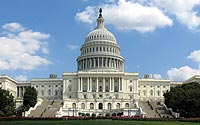 Web companies should be able to collect data from Web users, even when they attempt to opt out of online tracking, Association of National Advertisers CEO and
President Bob Liodice told the Senate Commerce Committee on Thursday.
Web companies should be able to collect data from Web users, even when they attempt to opt out of online tracking, Association of National Advertisers CEO and
President Bob Liodice told the Senate Commerce Committee on Thursday.
"Market research and product development actively rely on consumer data, not to market directly back to consumers, but
to gain broad insight about consumers’ collective preferences and needs so that businesses can better serve their customers," Liodice said in his written testimony.
Liodice added that
Web companies gather information from consumers in order to prevent fraud.
Sen. Jay Rockefeller (D-W.Va.), chairman of the committee, questioned whether companies should be able to collect
data for purposes of market research and product development. He said in his opening statement that those categories were so broad that they "could encompass almost anything."
Rockefeller
added that Orbitz's decision to target Mac users with more expensive recommendations than PC users shows "that companies will always be tempted to misuse the consumer information they collect." (It
emerged this week that Orbitz sometimes shows Mac users more expensive offers than PC users; Orbitz says it doesn't charge different rates for the same hotels.)
Liodice was among several
industry experts to testify at Thursday's Senate Commerce Committee hearing titled "The Need for Privacy Protections: Is Self-Regulation Adequate?” Liodice, who spoke on behalf of the umbrella
group Digital Advertising Alliance, argued that the industry's self-regulatory program adequately protects consumers' privacy.
The DAA currently requires companies to notify consumers about
online behavioral advertising and allow them to opt out of receiving targeted ads.
At the hearing, Rockefeller asked Liodice to respond to a statement by Federal Trade Commission Chairman
Jon Leibowitz that do-not-track should mean do-not-collect, with some limited exceptions.
"The Internet operates on some collection of data," Liodice said. He added that even if consumers
opt out of information gathering, there are "necessary exceptions" that allow companies to continue to collect data.
After the hearing, FTC Chairman Jon Leibowitz said in a statement that
he supports "an easy, persistent opt out on third-party tracking that limits collection with a few exceptions, such as security."
Leibowitz added: "There have been hiccups along the way,
but we think this process is moving forward, and we will reach the finish line -- choice and control for consumers, and a continuing vibrant internet ecosystem for businesses -- by the end of the
year."
Lawmakers and witnesses at the hearing also addressed browser-based do-not-track headers. The DAA said in February that it will require members to respect browser-based do-not-track
headers, but ad industry groups are still trying to reach a consensus with privacy advocates about how much information can be collected from users who have activated do-not-track headers. At the
time, the DAA was operating on the assumption that headers would not be turned on by default.
Recently, Microsoft surprised other companies by announcing that its next version of Internet
Explorer will activate do-not-track by default.
Liodice criticized that move, testifying that it will "profoundly adversely impact the broad array of advertising-supported services" that
consumers currently use. Liodice added that the decision is "inconsistent with the consensus achieved over the appropriate standards for collecting and using Web viewing data."
advertisement
advertisement